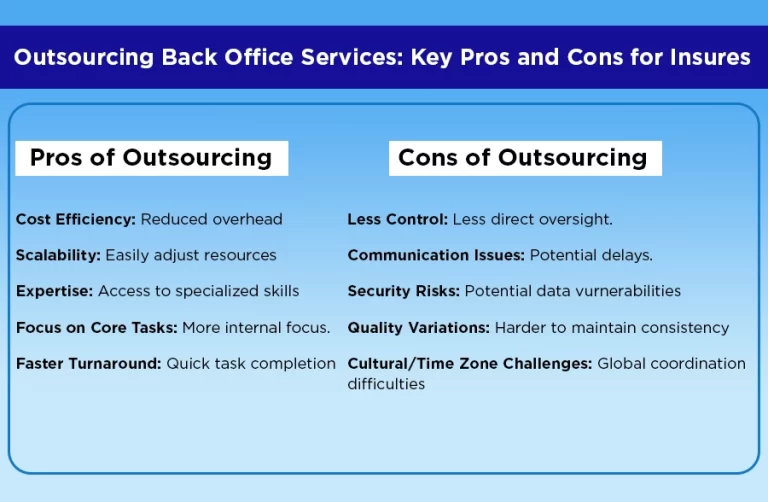Schedule a FREE call with our outsourcing expert now and get a precise quotation that meets your requirements. Don't wait - get started today!
Insurance companies manage an overwhelming amount of data, paperwork, and ongoing tasks. Behind the scenes, a dedicated team ensures that everything runs smoothly—processing claims, managing policyholder information, updating records, and more. This all happens through insurance back office services.
Now, imagine trying to sell insurance or attract new clients, all while juggling the daily grind of administrative tasks. It’s not easy, right? That’s where these services come in. They handle the time-consuming back-end work, allowing insurers to focus on the bigger picture—serving their clients and growing their business. These services can cover everything from processing insurance claims to ensuring regulatory compliance, ensuring everything is up to date and running efficiently.
But what exactly do these services entail, and why do so many insurance companies rely on them to stay ahead? Let’s take a deeper look at how insurance back office services help insurers streamline their operations and improve their bottom line.
What Insurance Back Office Services Entail
Insurance back office services are crucial for the smooth functioning of insurance companies. They handle the administrative tasks that support the front-line operations like underwriting, claims processing, and customer service. These tasks include data entry, document management, policy administration, and compliance with regulations. While not directly customer-facing, these services ensure that insurance companies can operate efficiently, meet regulatory requirements, and provide accurate records for audits and claims investigations.
By managing these behind-the-scenes processes, insurance back office services help reduce operational costs and streamline workflows. They also play a key role in improving service delivery and ensuring the company remains compliant with ever-changing regulations. In turn, this supports overall business growth, minimizes errors, and helps maintain customer satisfaction.
The Key Tasks Managed by Back Office Teams
The back office takes care of many essential functions, including:
-
Claims Processing: Ensuring claims are handled accurately and on time.
-
Policy Management: Keeping policies updated and organized.
-
Regulatory Compliance: Ensuring the company meets industry standards.
-
Document Management: Storing and organizing documents safely.
Without these services, insurers would face chaos and inefficiency.
Insurance back office services provide peace of mind. They make sure that all administrative tasks are done correctly, giving insurers the freedom to focus on their core business—serving clients.
The Role of Insurance Back Office Services in Risk Management
Risk management in insurance isn’t confined to policy underwriting but extends to the administrative processes as well. Outsourcing back office services helps mitigate operational risks by improving accuracy in data processing and ensuring compliance with regulatory standards, which are essential for minimizing risk exposure.
-
Risk Reduction Through Automation
By automating repetitive tasks like data entry and claims processing, insurance companies can reduce human error, which is one of the leading causes of operational mistakes. Automation enhances precision and consistency, directly lowering the risk of errors that could otherwise lead to financial or reputational damage.
-
Ensuring Regulatory Compliance
Insurance back office services are equipped with up-to-date tools and best practices that ensure compliance with evolving industry regulations. By staying current with legal requirements, these services help avoid costly fines, legal issues, and operational disruptions that can arise from non-compliance.
-
Tracking Key Risk Indicators (KRIs)
Back office services assist insurance companies by tracking key risk indicators (KRIs) in real time. By closely monitoring these indicators, insurers can identify potential risks early, enabling them to implement proactive strategies to address emerging issues before they become larger problems.
-
Providing Detailed Risk Reports for Informed Decision-Making
How Insurance Back Office Services Contribute to Data Security and Fraud Prevention
Insurance companies handle a large volume of sensitive data. Ensuring that this data is secure and protected from fraud is a top priority. Back office services play a critical role in safeguarding data and reducing the risk of fraudulent activities.
1. Enhancing Data Security with Secure Processing Systems
Outsourcing back office services to specialized providers ensures that sensitive information, such as customer personal details and policy records, is processed using secure systems. This minimizes the risk of data breaches and cyberattacks.
2. Utilizing Encryption and Secure Data Storage Solutions
To maintain confidentiality and integrity, insurance companies leverage encryption methods and secure data storage solutions provided by their back-office partners. This keeps customer data safe from unauthorized access.
3. Advanced Fraud Detection Tools in Back Office Operations
Insurance back office services are equipped with advanced fraud detection tools that can spot suspicious activities in real-time. These tools help identify irregularities in claims, underwriting, and policy transactions, preventing fraudulent claims before they occur.
4. Regular Audits and Risk Assessments
Outsourced back office providers conduct routine audits and risk assessments to ensure that data security protocols are being followed. Regular evaluations help identify vulnerabilities and implement corrective actions to further reduce fraud risk.
Challenges of Integrating Insurance Back Office Services into Existing Systems
Integrating outsourced back office services into a company’s existing infrastructure can be challenging but not impossible. Proper planning and communication between all parties involved are key to ensuring a smooth transition and effective collaboration.
-
Ensuring Seamless Data Flow
Insurance companies must ensure their systems align with their outsourced partner’s tools, allowing data to flow seamlessly across platforms. This requires not only technical compatibility but also efficient data mapping and synchronization to avoid delays or errors in the data transfer process.
-
Training and Onboarding
Staff members must be trained to work effectively with outsourced partners, ensuring that workflows remain uninterrupted and operations continue smoothly. Proper onboarding helps team members understand the new systems, fostering collaboration and reducing the learning curve during the integration phase.
-
Addressing Compatibility Issues Between Systems
Legacy systems may not always integrate easily with the modern software tools outsourcing partners use. Identifying and addressing these compatibility issues early in the process is crucial for smooth integration, as resolving them upfront can prevent costly delays and system malfunctions down the line.
-
Investing in Upgrades and System Enhancements
Make Your Insurance Operations More Efficient
At Magellan Solutions, we provide insurance back office services designed to take the weight off your shoulders. Our team specializes in insurance claims business process outsourcing, managing time-consuming tasks like claims processing, organizing documents, and ensuring compliance with the latest regulations. This allows you to focus on what matters most—growing your business and serving your clients.
We help you maintain smooth, efficient operations, giving you the freedom to stay competitive in today’s fast-paced insurance market. With our support, you can reduce operational burdens and improve your team’s productivity, ensuring that your business keeps running smoothly.
Book your FREE 60-minute business consultation today. Let’s discuss simple, practical ways to streamline your operations—no strings attached, just honest and useful insights!















